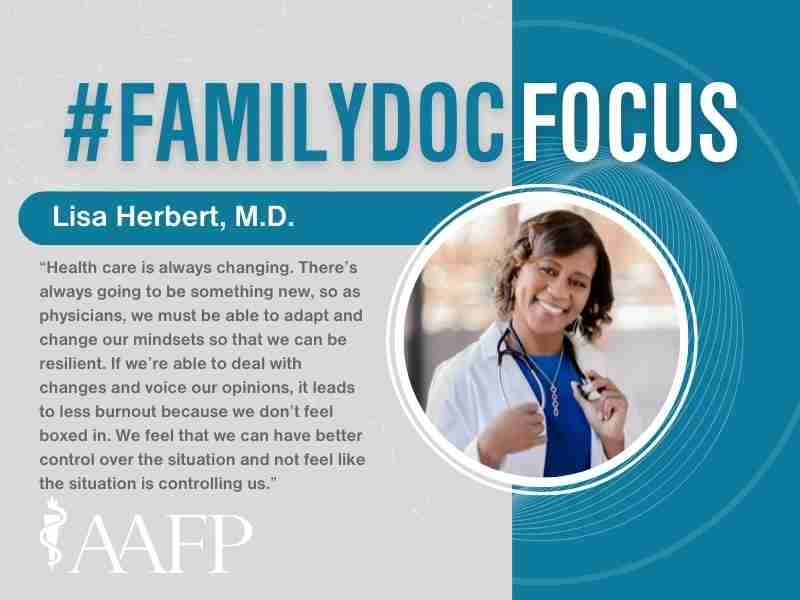FP Cultivated Leadership Skills to Overcome Burnout
August 17, 2022, 10:12 a.m. David Mitchell — After more than a decade in private practice, an observation by her teenage daughter made Lisa Herbert, M.D., reexamine her career.

“She basically came to me one day and said, ‘Mom, something is different about you. I’m not sure what’s going on, but you’re tired all the time. You’re not as happy as you used to be, and we don’t do the things we used to do,’” Herbert recalled. “It made me stop in my tracks, think about what she was saying and realize that I needed to do something different.”
Herbert took time off to rest and reflect and recognized that her daughter was right. The movies, trips and other activities she used to share with her children had stopped. She was consumed by work and too exhausted for the things she enjoyed.
“I was pushing myself to the point of burnout,” she said. “You think it’s something you’re not doing right, so you work longer and harder to get over it. That was my mindset, that this will get better. ‘This too shall pass.’ Well, it never passed.”
During a time when career coaching wasn’t common in health care, a friend in the finance industry connected Herbert with a life coach.
“It was very helpful for me to be able to develop this change mindset,” Herbert said. “It gave me the insight I needed to be able to look at things through a different lens and know that I had options. When I thought about how lucky I was to have a coach, I also realized that a lot of my physician colleagues could benefit from the same thing.”
In 2015, Herbert took a six-month course to become a certified personal and executive coach. In January 2016, she launched Just The Right Balance LLC, which offers coaching, consulting, workshops and training to help physicians become effective leaders. She also works as a physician peer coach and executive coach for other firms, working with individual physicians as well as hospitals and health care systems.
“It helped me understand the role of a coach, who really is an accountability partner for their client,” she said of her training. “It’s also someone who helps their clients see their blind spots, which happens a lot with physicians who go through burnout. You just don’t see things that are happening externally until someone brings it to the forefront. It helped me develop a process by which I’m able to really get my clients to open up and let me in to see what struggles they’re having and to help.”
Herbert attributed her burnout, in part, to lacking certain leadership skills that physicians benefit from but aren’t always taught in medical school or residency, including conflict management, emotional intelligence, building and working in teams and the ability to influence.
“Those skills are necessary for physicians to be able to really thrive and succeed in their own work environments,” said Herbert, who has experience as a medical director both in the clinical setting and with a private payer. “That’s why I decided to go into coaching, to help other physicians become high-performing leaders who will use their voice to improve and strengthen the health care system.”
Herbert will present a session titled “Developing a Leadership Mindset For Improved Outcomes and Reduced Burnout” during the 2022 Family Medicine Experience, Sept. 20-23 in Washington, D.C. Herbert said the course will cover the crucial skills needed for leadership and explore different leadership styles and how to implement them in practice.
Herbert said regardless of role or career stage, physicians “should show up as leaders.” Leadership skills, she said, are needed to help physicians address challenges, lead within their organizations and develop resiliency.
“Health care is always changing,” she said. “There’s always going to be something new, so as physicians, we must be able to adapt and change our mindsets so that we can be resilient. If we’re able to deal with changes and voice our opinions, it leads to less burnout because we don’t feel boxed in. We feel that we can have better control over the situation and not feel like the situation is controlling us.”
Herbert, who was a clinical assistant professor for the (then) New Jersey Medical School at the University of Medicine and Dentistry of New Jersey in Newark from 2007 to 2012, is keeping a foot in both the clinical and academic worlds as a volunteer physician at the student-run, free HEAL Clinic at the Morehouse School of Medicine in Atlanta.
“I get the most joy out of teaching and, because of my years of experience, I still feel like I have a lot to offer students,” she said. “I especially recognize the role I play to those students in underrepresented communities. Only 5% of physicians in the U.S. are identified as Black or African American. I love being able to be that role model and mentor for minority students who want to become physicians.”